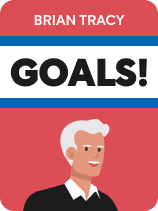

This article is an excerpt from the Shortform book guide to "Goals!" by Brian Tracy. Shortform has the world's best summaries and analyses of books you should be reading.
Like this article? Sign up for a free trial here .
What is the current goal you’re working towards? What are the potential obstacles that could get in your way?
Once you have a comprehensive view of your goals and when you want to achieve them, the next step is to identify potential challenges. When you know the challenges and potential problems ahead of you, you can be better prepared to face them.
Here is how to anticipate and prepare for the obstacles to achieving your goals.
Identify Challenges
According to Tracy, challenges are inevitable and failure is part of the process of pursuing your goals. He writes that successful people understand that the only real failure is giving up. (Shortform note: Remove the stigma of failure by learning to see it as something positive: When you fail, remind yourself that it’s only a temporary setback and that the experience holds a valuable lesson. Then, reflect on how you can use the lesson to move forward.)
Tracy offers these two tips for preparing for the obstacles to achieving your goals:
1) Find the root cause. Write down every possible roadblock and look at each problem from every angle, digging deeper until you find its root cause. Tracy says it’s important to identify the root cause of your problems so that you can determine the right course of action. (Shortform note: To encourage deeper thinking as you reflect on your problems, revisit the “five whys” technique you used while clarifying your values: Look at each problem and keep asking why it’s happening until you arrive at the root cause.)
If you’re having trouble determining the root cause, ask someone close to you to give their perspective. There’s a big chance that the root cause might be you—Tracy writes that 80 percent of your obstacles stem from your own weaknesses, fear, and doubt. (Shortform note: These weaknesses vary from person to person. Some of the internal forces that might sabotage your progress are a lack of discipline or focus, perfectionism, and the need to be liked.)
2) Find solutions, not excuses. Instead of dwelling on your problems and how they make you feel, Tracy says to stay solution-oriented. (Shortform note: One way to do this is to ask solution-oriented questions. For example, instead of asking, “Why am I not getting promoted?” ask, “What three things should I accomplish this quarter to improve my performance?”)
Determine the Skills You Need
Once you identify your challenges, you’ll have a clearer idea of the skills required for you to overcome them and reach your goals. Tracy argues that if you don’t have the necessary skills or if you’re weak in some areas, commit to learning and strengthening those skills. Learning new things will not only help you reach your goals but will also increase your self-esteem and give you more courage and confidence to pursue what you want. (Shortform note: Additionally, research suggests that continuous learning offers advantages outside of goal achievement, such as keeping you agile and adaptable to change, helping you make new friends, broadening your perspective, and enriching your life.)
Tracy says that learning new skills is especially important for your career goals because your skills are directly related to your earning ability—he writes that the more skilled you are, the higher your potential income. (Shortform note: Tracy associates career success with a higher income, so to him, the end goal of upgrading your skills is to make more money. However, some argue that career success is not just about accomplishments, but a combination of financial stability and personal fulfillment. Clarifying values in the pre-goal-setting stage can help you come up with your own definition of career success.)
Tracy gives four tips to help you determine the skills you need:
1) Identify the Key Result Areas for Your Specific Field. Tracy explains that key result areas (KRAs) are the skills you need to do your job. In management, for example, the KRAs are planning, organizing, staffing, delegating, supervising, measuring, and reporting. Once you’ve identified your specific KRAs, rate yourself in each area on a scale of one to 10. (Shortform note: To identify and assess your KRAs, go back to your job description and look at job postings in your field, evaluate both your hard and soft skills, and review your performance evaluations.)
2) Ask Others to Rate You. Next, Tracy recommends asking your boss, customers, and co-workers to rate you from one to 10 on your KRAs, or have them fill out an anonymous survey to comment on your performance. The results will give you a more objective view of your performance. (Shortform note: Receiving critical feedback might make you feel discouraged or defensive. To become more receptive to feedback, authors Douglas Stone and Sheila Heen write that you should learn to view feedback as evaluations rather than judgments. Read more in our full guide to Thanks for the Feedback.)
3) Identify Your Weakest Area. To identify your weaknesses, review your self-assessment and others’ assessment of your skills. Tracy says it’s important to identify your weakest area because you can only go as high up the career ladder as your weakest skill will allow you. Resolve to improve until you score no lower than a seven on any of your key skills. (Shortform note: Tracy writes that for you to be successful, all your skills should have a minimum rating of seven. However, some would argue that it’s impossible to be good at everything. Avoid wasting time trying to turn your weaknesses into strengths and work on managing them instead. Put in the effort to get just good enough, and consider working with people with complementary strengths to make up for your weak areas.)
4) Leverage What You’re Good At. Finally, Tracy advises that you use your strengths—the skills that feel natural to you, that you perform well, and that make you feel like you’re in the zone—to your advantage. If you discover that your particular talents are more suited to another field, don’t be afraid to start fresh. Working in a field that taps into your natural abilities can more quickly increase your earning ability than sticking it out in a field that doesn’t play to your strengths. (Shortform note: If you think that your strengths are better suited to another career, don’t make the jump right away. It’s prudent to first set up informational interviews with people in your prospective new career field. Your goal during the interviews is to learn as much as you can about the industry—both negatives and positives—so you can make an informed decision.)

———End of Preview———
Like what you just read? Read the rest of the world's best book summary and analysis of Brian Tracy's "Goals!" at Shortform .
Here's what you'll find in our full Goals! summary :
- Brian Tracy's steps to setting and reaching your goals
- How to approach your goals with the right mentality
- Why persistence is more important than courage






